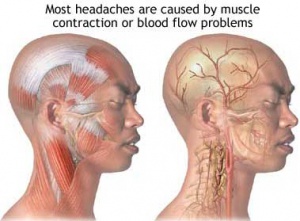Headache
Contents
Description & Causes
A headache is a pain or ache which can occur in any area of the head. It's a symptom, rather than a disease in itself. Headaches can result from fatigue, emotional disorders, allergies, stress, anxiety or from more serious issues such as brain tumor or aneurysm.
Environmental (pollutants/body posture/lighting/sound), stress (physical/mental/emotional), dietary (allergies to food/additives), or organic causes such as hypertension may all play a part in the creation of a headache.
Migraines may last from several hours to several days, and symptoms may include severe one-sided throbbing pain, nausea, tremor, dizziness and sensitivity to light or sound. Special attention should be paid to prevent vitamin deficiencies of iron, niacin and pantothenic acid, B5. Treatment for migraines may include pain relieving drugs or natural herbs such as white willow bark, also the entire B complex for nerve health.
Beneficial Vitamins & Minerals
Some nutrients which are beneficial in both the prevention and treatment of headaches are vitamin A, vitamin B1, vitamin B2, vitamin B6, niacin, vitamin B15 pangamic acid, vitamin B5 panthothenic acid, vitamin C, vitamin E, calcium and potassium.
Helpful Herbs
Some herbs which are recognized for their treatment of headaches are; chamomile, elder flower, jamaican dogwood, lavender, lemon grass, marjoram, peppermint, rosemary, skullcap, thyme, valerian, wood betony, wormwood and white willow bark.
Essential oils from herbs such as feverfew are known to relieve migraines by either rubbing on the temples, or using in cold compresses. Sinus headaches have good results with lavender, rosemary and eucalyptus, as these herbs also have antiseptic properties, and help to combat both congestion and infection.
Alternative Therapies
Other treatments such as acupuncture and acupressure have shown to be of great benefit to those who suffer with headache pain.
Related Discussion
- Headache
- Acupuncture and Migraines
- Exercise: Headache Pain
- Lemon Grass May Relieve Headache/Migraines
- White Willow Bark
- Alternative Answers for Menstrual Migraines
